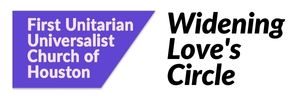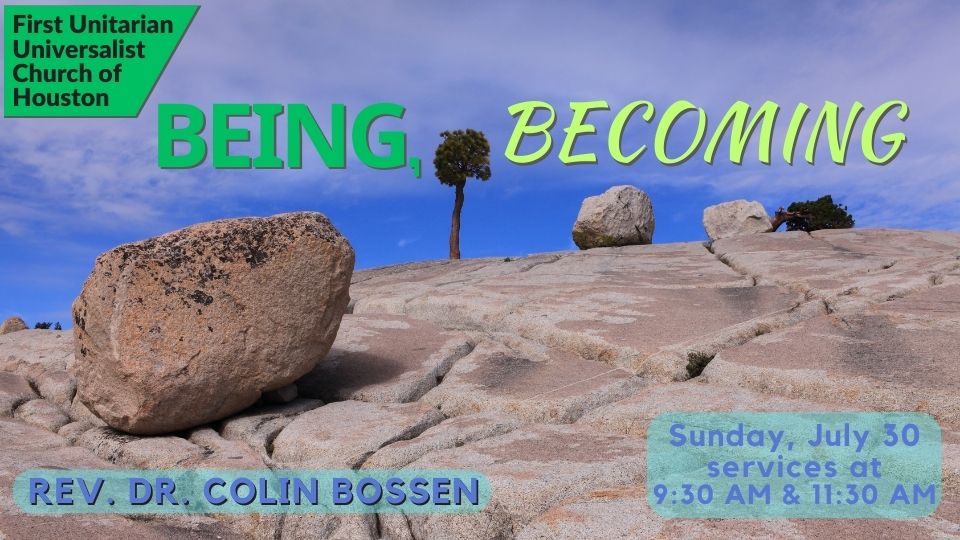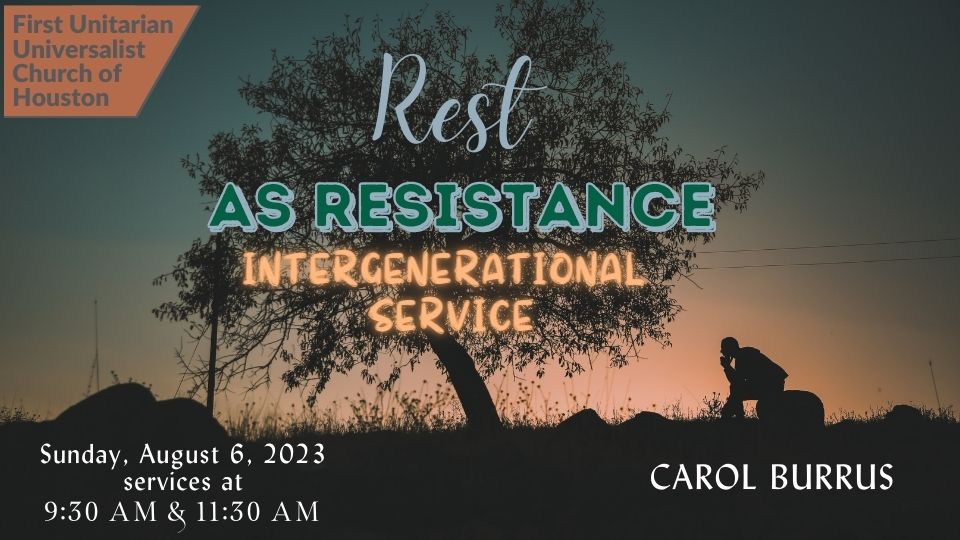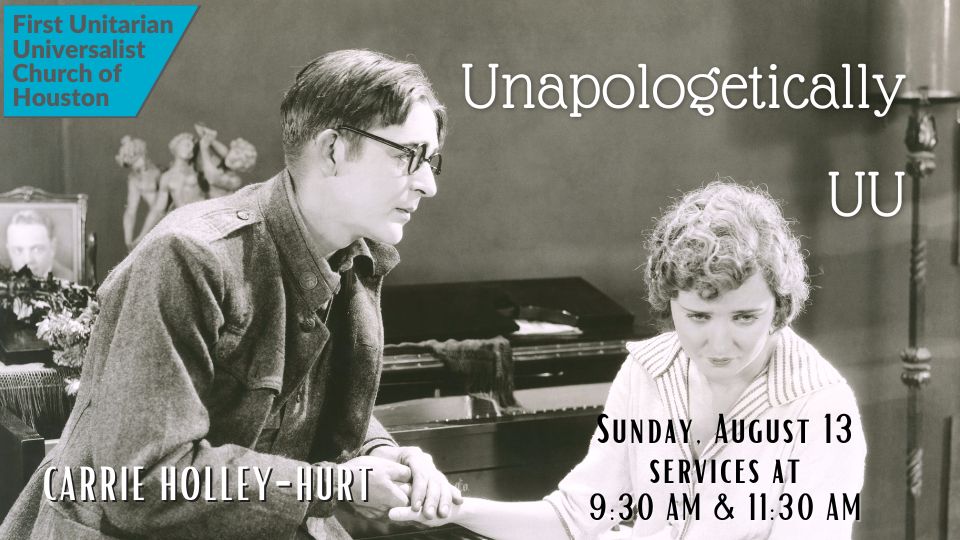News – August 18, 2023
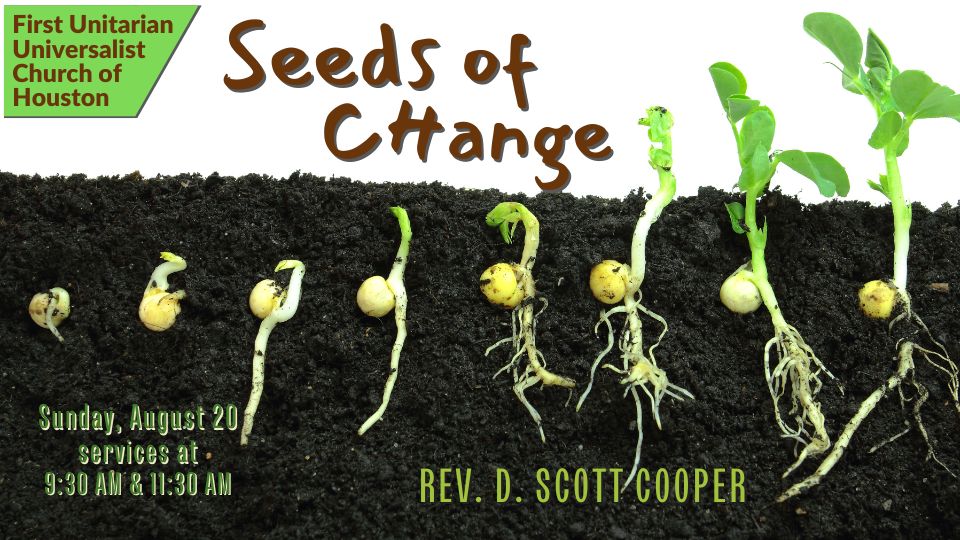
Dear Beloved Community,
As we face the hottest months on record in our already hot part of the world this summer, we cannot fail to note that our world is full of troubles. And our media feeds are full of so much content grabbing at our attention from fires in Hawaii to the latest information on the legal ramifications of the former president’s abuses of power, it is easy to be unsettled and even fearful.
In my sermon a little over a week ago, I invited us to take regular rests. Rest is not only for our own health and mental well-being but as a rebellion against the treatment of workers as machines in a capitalistic culture.
Today, I am encouraging another way to create a grounded life, one in which we can find rest, connection and meaning…rituals.
Rituals help us order the world, bring people together to share moments and help us connect physically, emotionally and mentally to something meaningful. Observed across all known cultures in both secular and religious settings, rituals seem to be part of our very genetic structure. Some rituals seem to even turn off the part of the brain that focuses on time and place, as we experience the repetition of a meaningful practice with others, creating a (sometimes) mystical, sacred or spiritual experience. Evidence of rituals have been found by anthropologists to exist even before language developed, providing communication and connection deeper than words.
I invite you to participate in rituals.
As a parent, when our children were living with us, we had rituals for mealtime and bedtime. Mealtime was a regular evening coming together which included singing a song of gratitude…”Thank you for this food, for this food, for this glorious, glorious food. And the animals and the vegetables and the minerals that make it possible”… at mealtime we also shared our “highs and lows” of the day. Our nighttime rituals included bath and stories, followed by songs and sleep. Our family also joined in annual rituals through this church, which included the Pumpkin Carving, Spring Retreat, the Easter Parade and many more.
I hope you will reflect on what rituals you have that already bring meaning and find new ones. Daily meditation, regular sharing of meals with a friend or family, following the cycle of the moon, or the planting of annual vegetables can become rituals if done with intention. There are many possibilities. I want to call your attention to three annual rituals which are coming up soon at church.
First is our annual Water Communion, when we bring water from where we have spent our time this summer, pour the waters together, symbolizing our coming together as a community. (Sunday, August 27th @ 9:30 or 11:30)
Second is a quirky, lovely ritual developed 25 years ago by the Religious Education Committee at our church, called the Feast of All Good Children. Like other Unitarian Universalist rituals, it is not one that comes from a divine source or thought to be sent to us by God. It developed organically from people in the community, understanding important life events that needed to be honored and creating a way of coming together to mark them. Children (and any adults who want to join in), announce a transition in their life (starting a new grade at school, becoming a big sister), a drum roll please, then they jump over a fire! (Sunday, August 27th after either service in children’s courtyard)
Third is our Fall Equinox Service. Four times a year, we pay attention to the changes in the earth, by paying attention, calling the 4 directions and coming together in a intimate circle worship: Winter Solstice, Spring Equinox, Summer Solstice and Fall Equinox. (September 21, 7:00 pm, Channing Hall).
Finally, I invite you to create or find other rituals with your family and friends. You might find new ways to engage in the rituals of our larger culture. What will you do when Labor Day comes? Christmas? Can you find ways to create meaning that fit with your values, rather than those handed to us by American culture, which often are materialistic and fail to connect to our values. Perhaps on Labor Day, you decide to celebrate Labor Unions. See below how we are celebrating Labor Day weekend at church with a Labor Song & Storyfest, focused on supporting and celebrating the Labor Movement.
Hope to see you at a church ritual soon!
Carol Burrus
Director of Religious Community
As we face the hottest months on record in our already hot part of the world this summer, we cannot fail to note that our world is full of troubles. And our media feeds are full of so much content grabbing at our attention from fires in Hawaii to the latest information on the legal ramifications of the former president’s abuses of power, it is easy to be unsettled and even fearful.
In my sermon a little over a week ago, I invited us to take regular rests. Rest is not only for our own health and mental well-being but as a rebellion against the treatment of workers as machines in a capitalistic culture.
Today, I am encouraging another way to create a grounded life, one in which we can find rest, connection and meaning…rituals.
Rituals help us order the world, bring people together to share moments and help us connect physically, emotionally and mentally to something meaningful. Observed across all known cultures in both secular and religious settings, rituals seem to be part of our very genetic structure. Some rituals seem to even turn off the part of the brain that focuses on time and place, as we experience the repetition of a meaningful practice with others, creating a (sometimes) mystical, sacred or spiritual experience. Evidence of rituals have been found by anthropologists to exist even before language developed, providing communication and connection deeper than words.
I invite you to participate in rituals.
As a parent, when our children were living with us, we had rituals for mealtime and bedtime. Mealtime was a regular evening coming together which included singing a song of gratitude…”Thank you for this food, for this food, for this glorious, glorious food. And the animals and the vegetables and the minerals that make it possible”… at mealtime we also shared our “highs and lows” of the day. Our nighttime rituals included bath and stories, followed by songs and sleep. Our family also joined in annual rituals through this church, which included the Pumpkin Carving, Spring Retreat, the Easter Parade and many more.
I hope you will reflect on what rituals you have that already bring meaning and find new ones. Daily meditation, regular sharing of meals with a friend or family, following the cycle of the moon, or the planting of annual vegetables can become rituals if done with intention. There are many possibilities. I want to call your attention to three annual rituals which are coming up soon at church.
First is our annual Water Communion, when we bring water from where we have spent our time this summer, pour the waters together, symbolizing our coming together as a community. (Sunday, August 27th @ 9:30 or 11:30)
Second is a quirky, lovely ritual developed 25 years ago by the Religious Education Committee at our church, called the Feast of All Good Children. Like other Unitarian Universalist rituals, it is not one that comes from a divine source or thought to be sent to us by God. It developed organically from people in the community, understanding important life events that needed to be honored and creating a way of coming together to mark them. Children (and any adults who want to join in), announce a transition in their life (starting a new grade at school, becoming a big sister), a drum roll please, then they jump over a fire! (Sunday, August 27th after either service in children’s courtyard)
Third is our Fall Equinox Service. Four times a year, we pay attention to the changes in the earth, by paying attention, calling the 4 directions and coming together in a intimate circle worship: Winter Solstice, Spring Equinox, Summer Solstice and Fall Equinox. (September 21, 7:00 pm, Channing Hall).
Finally, I invite you to create or find other rituals with your family and friends. You might find new ways to engage in the rituals of our larger culture. What will you do when Labor Day comes? Christmas? Can you find ways to create meaning that fit with your values, rather than those handed to us by American culture, which often are materialistic and fail to connect to our values. Perhaps on Labor Day, you decide to celebrate Labor Unions. See below how we are celebrating Labor Day weekend at church with a Labor Song & Storyfest, focused on supporting and celebrating the Labor Movement.
Hope to see you at a church ritual soon!
Carol Burrus
Director of Religious Community
